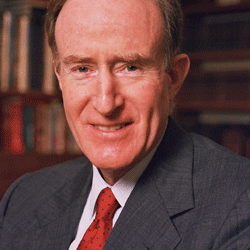
Benjamin M. Friedman is the William Joseph Maier Professor of Political Economy, and formerly Chairman of the Department of Economics, at Harvard University. He has written extensively on economic policy, and in particular on the role of the financial markets in shaping how monetary and fiscal policies affect overall economic activity. His book Day of Reckoning: The Consequences of American Economic Policy Under Reagan and After (Random House, 1988) received the George S. Eccles Prize, awarded annually by Columbia University for excellence in writing about economics. His work has also addressed broader questions concerning economics and economic policy. His book The Moral Consequences of Economic Growth (Knopf, 2005) examined the political and social implications of growth versus economic stagnation.
In addition to Day of Reckoning and The Moral Consequences of Economic Growth, Mr. Friedman is the author and/or editor of nine other books, aimed primarily at economists and economic policymakers, as well as the author of more than one hundred fifty articles on monetary economics, macroeconomics, and monetary and fiscal policy, published in numerous journals. Specific subjects of this work include the effects of government deficits and surpluses on interest rates, exchange rates, and business investment; appropriate guidelines for the conduct of U.S. monetary policy; and appropriate policy actions in response to crises in a country’s banking or financial system. He is also a frequent contributor to publications reaching a broader audience, including especially The New York Review of Books.
Mr. Friedman’s current professional activities include serving as a director and member of the editorial board of the Encyclopaedia Britannica, a director of the Private Export Funding Corporation, a trustee of the Pioneer Funds, and a director of the National Council on Economic Education. In addition, he has served as director of financial markets and monetary economics research at the National Bureau of Economic Research, as a member of the National Science Foundation Subcommittee on Economics, as an adviser to the Congressional Budget Office and to the Federal Reserve Bank of New York, as a trustee of the College Retirement Equities Fund, and as a director of the American Friends of Cambridge University. He is also a member of the Council on Foreign Relations and the American Academy of Arts and Sciences.
Mr. Friedman joined the Harvard faculty in 1972. Before then he worked with Morgan Stanley & Co., investment bankers in New York. He had also worked in consulting or other capacities with the Board of Governors of the Federal Reserve System, the Federal Reserve Bank of New York, and the Federal Reserve Bank of Boston. Mr. Friedman received the A.B., A.M. and Ph.D. degrees in economics from Harvard University; during his graduate study at Harvard he was a Junior Fellow of the Society of Fellows. In addition, he received the M.Sc. degree in economics and politics from King’s College, Cambridge (U.K.), where he studied as a Marshall Scholar.
Among other awards, Mr. Friedman was the 2005-6 recipient of the John R. Commons Award, presented every two years in recognition of achievements in economics and service to the economics profession, and in 2008 he received the Medal of the Italian Senate.